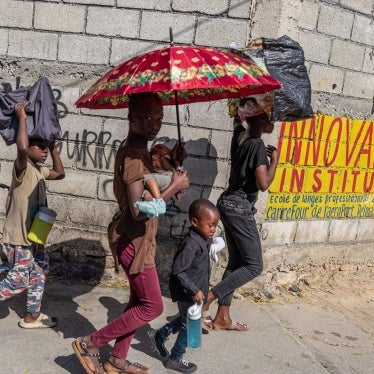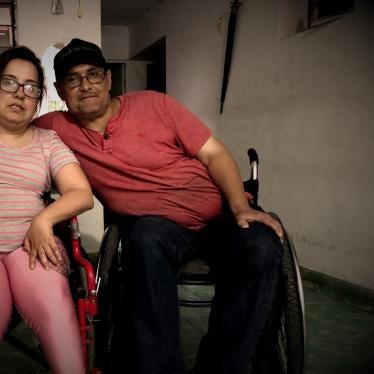Good afternoon,
I am thrilled to be here today to share a piece of my story and discuss how support for people with disabilities can be structured to enable meaningful participation in society, including the job market. This is a story about overcoming social barriers, embracing acceptance, cultivating self-love, and relentlessly pursuing opportunities. I am a 27-year-old woman with an intellectual disability, and I am privileged to speak to you today not only as the current holder of the Marca Bristo Fellowship from Human Rights Watch but also as a disability rights advocate with lived experience.
Let me begin by clarifying: disability is not an illness; we are valuable individuals endowed with various abilities, capable of making decisions and contributing positively to our communities. However, we encounter numerous social and attitudinal barriers that limit our daily participation and active engagement in society.
When I was four, my parents were informed that I could not attend a bilingual school because I would be incapable of speaking one language, let alone two. Then, at age 11, they were told I wouldn’t graduate high school. These individuals focused solely on my limitations, whereas my family and supporters recognized and nurtured my strengths.
Today, I have successfully completed my education, I am fluent in both English and Spanish, I hold a job with the necessary support to excel, and I am continually learning how to advocate for disability rights. Time has disproved those who doubted me due to their ableist prejudices. It has shown that with resolute support to include us in society, people with disabilities can thrive just like anyone else.
But my story is not the only one I wish to share with you today. There are exemplary practices that society can adopt to ensure accessible work environments for people with disabilities. The government of Iraq, for instance, has legislation that mandates employment quotas in the public and private sector for people with disabilities. Unfortunately, research by Human Rights Watch in Iraq has shown that the government is failing to meet these obligations, a common issue in many countries.
The CRPD Committee General Comment 8 recognizes employment quotas as one of the possible methods to promote employment for people with disabilities. Such quotas should be affirmative actions aimed at integrating historically marginalized groups into the workforce, ensuring they can exercise their rights. However, effective implementation and follow-up are essential, and currently, these are lacking in Iraq.
Quotas themselves are often insufficient to dismantle or address barriers to employment faced by persons with disabilities and, if used, should be paired with enforcement of other non-discrimination and equality legislation, to avoid tokenism and segregation of people with disabilities in the workplace.
Despite these challenges, there is room for hope. Muwafaq Al Khafaji, head of the Iraqi Alliance of Disability Organizations (IADO), conducts workshops to educate employers about the employment rights of people with disabilities and encourages them to hire accordingly. Following one such workshop, Muhammed Ali Al Mayahi, CEO of Bab al-Agha Bakeries in Baghdad, employed five deaf workers. Impressed by their performance, he expanded this initiative, now employing nearly 30 deaf individuals and advocating for other businesses to follow suit.
In many countries, including Iraq and my own, Colombia, significant barriers to the inclusion of people with disabilities remain. Nevertheless, with suitable programs from both public and private sectors, improvements can be made. For instance, in Colombia, the Transition to Adult Life Education Program (OAT) by the NGO COOPMENTE, in partnership with Universidad del Rosario, teaches young adults with disabilities essential life skills and rights, fostering a supportive community and belonging.
Thanks to such programs, I have been able to assert my rights, gain a unique educational experience, and integrate fully into society. Today, I manage my finances, live independently, and make my own decisions. Moreover, I am part of a supportive network that I can rely on when needed.
Both the employment program in Iraq and COOPMENTE, the network of Colombian families, demonstrate that with genuine opportunities, appropriate support, and belief in our abilities, people with disabilities can surpass obstacles, meet high expectations, and achieve significant societal contributions.
We live in a world that often professes equality and inclusion. That should mean that all human beings, regardless of our impairments, deserve respect and dignity, equal access to education, meaningful employment opportunities, and the ability to live independently and with dignity.
As a Marca Bristo Fellow, I am preparing myself to advocate for the rights of people with disabilities more vigorously. My goal is to raise awareness among governments, civil society organizations, the private sector, and society at large about our rights. We need empowerment, supportive networks, and real opportunities for inclusion to lead dignified, independent, and autonomous lives.
Today, I call on you to contribute actively to fulfilling the UN Convention on the Rights of Persons with Disabilities. This convention allows us to demand our rights, effectively participate in society, and continue striving for a more inclusive world.
Based on the points previously mentioned, I would like to make the following recommendations:
1. Regarding Inclusive Education:
- It is necessary to implement high quality inclusive educational systems that adapt to the individual needs of students with disabilities, at all levels, including pre-primary, medium and higher education.
- More opportunities for higher education should be opened up for young people with disabilities, allowing them to develop professionally according to their interests and abilities and thus have access to decent work.
2. Employment for All:
- Employment is not only a matter of equity; it is a fundamental right that allows us to demonstrate our skills and talents and provides us with the opportunity to contribute and be an active part of society's workforce. Most importantly, it is our vehicle towards our independence and autonomous life.
- Countries should regularly collect statistics on the number of people with disabilities and their employment rates.
- Establish a monitoring and evaluation mechanism to ensure the working conditions and wages of employees with disabilities are on par with those of other employees.
- Establish a monitoring and reporting mechanism for government ministries to periodically report on their performance in meeting any employment quotas that may be established for people with disabilities.
- Governments should create more possibilities that promote formal and decent employment with support systems for people with disabilities.
Let’s work together to build a world where everyone, in all our diversity, is recognized. We deserve the opportunity to live full, autonomous lives, to be part of society, and to realize our dreams, just like anyone else here. Supporting this journey is essential, as people with disabilities are fundamental pillars of our societies.
Thank you very much!
Mariana Lozano







